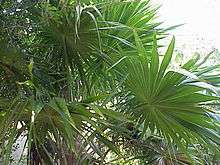Thrinax
| Thrinax | |
|---|---|
 | |
| Thrinax radiata | |
| Scientific classification | |
| Kingdom: | Plantae |
| (unranked): | Angiosperms |
| (unranked): | Monocots |
| (unranked): | Commelinids |
| Order: | Arecales |
| Family: | Arecaceae |
| Subfamily: | Coryphoideae |
| Tribe: | Cryosophileae[1] |
| Genus: | Thrinax L.f. ex Sw. |
| Species | |
|
Thrinax ekmaniana | |
| Synonyms[2] | |
Thrinax is a genus in the palm family, native to the wider Caribbean. It is closely related to the genera Coccothrinax, Hemithrinax and Zombia.[3] Flowers are small and bisexual, and are borne on small stalks.
Thrinax consists of four species. Three of them are single-island endemics - Thrinax ekmaniana is exclusively endemic to hills Mogotes de Jumagua, Cuba while Thrinax excelsa and Thrinax parviflora are endemic to Jamaica. The fourth species, Thrinax radiata, is more widespread - it is present in the Greater Antilles, the Bahamas, south Florida, Mexico and Central America.
Taxonomy
| |||||||||||||||||||||||||||||||||||||||||||||
| Simplified phylogeny of the tribe Cryosophileae (except Trithrinax) based on the nuclear genes PKR and RPB2.[4] |
In the first edition of Genera Palmarum (1987), Natalie Uhl and John Dransfield placed the genus Thrinax in the subfamily Coryphoideae, the tribe Corypheae and the subtribe Thrinacinae[5] Subsequent phylogenetic analysis showed that the Old World and New World members of the Thrinacinae are not closely related. As a consequence of this, Thrinax and related genera have been placed in their own tribe, Cryosophileae.[1] In 2008, Leucothrinax morrisii (formerly T. morrisii) was split from Thrinax after phylogenetic studies showed that its inclusion in Thrinax would render that genus paraphyletic.[6]
References
- 1 2 Dransfield, John; Natalie W. Uhl; Conny B. Asmussen; William J. Baker; Madeline M. Harley; Carl E. Lewis (2005). "A New Phylogenetic Classification of the Palm Family, Arecaceae". Kew Bulletin. 60 (4): 559–69. JSTOR 25070242.
- ↑ "Thrinax". World Checklist of Selected Plant Species. Royal Botanic Gardens, Kew. Retrieved 10 April 2010.
- ↑ Henderson, Andrew; Gloria Galeano; Rodrigo Bernal (1995). Field Guide to the Palms of the Americas. Princeton, New Jersey: Princeton University Press. ISBN 0-691-08537-4.
- ↑ Roncal, Julissa; Scott Zona; Carl E. Lewis (2008). "Molecular Phylogenetic Studies of Caribbean Palms (Arecaceae) and Their Relationships to Biogeography and Conservation". Botanical Review. 74 (1): 78–102. doi:10.1007/s12229-008-9005-9.
- ↑ Uhl, Natalie E.; John Dransfield (1987). Genera Palmarum: a classification of palms based on the work of Harold E. Moore Jr. Lawrence, Kansas: The L. H. Bailey Hortorium and the International Palm Society.
- ↑ Lewis, Carl E.; Scott Zona (2008). "Leucothrinax morrisii, a new name for a familiar Caribbean palm". Palms. 52 (2): 84–88.